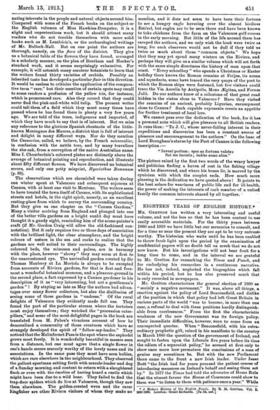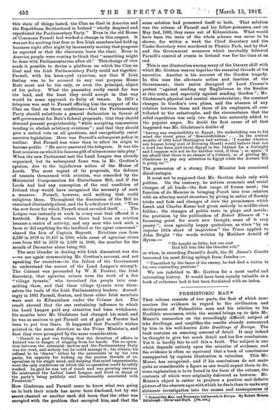EIGHTEEN YEARS OF ENGLISH HISTORY.*
MR. GRETTON has written a very interesting and useful volume, and not the less so that he has been content to use easily accessible materials. For the thirty years between 1880 and 1910 we have little but our memories to consult, and for a time so near the present they are apt to be very untrust- worthy. The historian who waits until he has been enabled to throw fresh light upon the period by the examination of confidential papers will no doubt tell us much that we do not now know. But his investigations will not bear fruit for a long time to come, and in the interval we are grateful to Mr. Gretton for ransacking the Times and Punch, and for embodying his researches in a continuous narrative. He has not, indeed, neglected the biographies which fall within his period, but he has also preserved much that is only recorded in newspapers.
Mr. Gretton characterizes the general election of 1880 as " mainly a negative movement." It was, above all things, a reaction against the policy of Lord Beaconsfield, and dislike of the position in which that policy had left Great Britain in various parts of the world "was to become, in more than one case, a refusal to deal with these positions hardly distinguish- able from carelessness." From the first the characteristic weakness of the new Government was its foreign policy. Their immediate difficulties, however, were to come from an unsuspected quarter. When " Beaconsfield, with his extra- ordinary prophetic gift, raised in his manifesto to the country in March 1880 the question of the government of Ireland, and sought to fasten upon the Liberals five years before its time the odium of a separatist policy," he seemed at first only to show once more how premature the conclusions of a man of genius may sometimes be. But with the new Parliament there came to the front a new Irish leader. Under Isaac Butt "the Irish had for years pursued the patient course of introducing measures on Ireland's behalf and seeing them set by." In 1877 the Times had told the advocates of Home Rule that the utmost favour the House of Commons could show to them was " to listen to them with patience once a year." While • A Modern History of the English People. By B. R. Grettpn. Vol. 1880-1898. London: Grant Richards. [7s. 6d. net.]
this state of things lasted, the Clan na Gael in'America and the Republican Brotherhood in Ireland " wholly despised and repudiated the Parliamentary Party." Even in the old House of Commons Parnell had worked a change in this respect. It
was not for nothing that four or five Irish members had held up business night after night by incessantly moving that progress be reported or that the chairman leave the chair. Even in America people were coming to think that "something might be done with Parliamentarism after all." This change of view made it possible to devise a platform on which the Clan na Gael and the Irish Parliamentary Party could act together. Parnell, with his keen-eyed cynicism, saw that if .Irish feeling was to be aroused to any real purpose Home Rule must not be the only, or even the principal, object of his policy. What the peasantry really cared for was the land, and the least they could accept in that way would be some approach to fixity of tenure. In 1878 a telegram was sent to Parnell offering him the support of the Clan na Gael on three conditions—that the Parliamentary Party should substitute a general declaration in favour of self-government for Butt's federal proposals; that they should demand pesi.sait proprietorship, "while accepting concessions tending to abolish arbitrary evictions"; and that they should give a united vote on all questions, and energetically resist coercive legislation. Here was Parnell's subsequent policy in outline. But Parnell was wiser than to allow its origin to become public. " He never answered the telegram. It was the first occasion on which his famous gift of silencecame into-play." When the new Parliament met the Land League was already organized, but its subsequent fame was, in Mr. Gretton's opinion, due to the injudicious action of the House of Lords. The most urgent of its proposals, the defence of tenants threatened with eviction, was conceded by the Ministerial Compensation for Disturbance Bill, and if the Lords had had any conception of the real condition of Ireland they would have recognized the necessity of such a measure. Parnell, however, said nothing that could enlighten .them. Throughout the discussion of the Bill he remained obstinately silent, and the LD•ds threw it out. " Then the new force for which Parnell stood revealed itself. . . . The League was instantly at work in every case that offered it a foothold. Every farm where there had been an eviction became a centre of activity, and any man who took such a farm or did anything for the landlord or the agent concerned" shared the fate of Captain Boycott. Evictions rose from .6.239 in 1879 to 10,457 in 1880, while cases of agrarian crime rose from 863 in 1879 to 2,589 in 1880, the number for the month of December alone being 865.
. The next blunder in dealing with Irish discontent was due —we are again summarizing Mr. Gretton's account, and not speaking for ourselves—to the failure of the Government to understand the source of the Land League's strength. The Cabinet was persuaded by W. E. Forster, the Irish Secretary, that agrarian crimes were the work of a few "village tyrants," who terrorized the people into com- mitting them, and that these village tyrants were them- selves the tools of the Irish Parliamentary leaders. Accord- ingly in 1881 Parnell, Sexton, and three other Irish members were sent to Kilmainham under the Crimes Act. The result showed that the one restraining influence to which the Land League paid any attention had been withdrawn.
Six months later Mr. Gladstone had changed his mind, and he was as anxious to get Parnell out of gaol as Forster had been to put him there. It happened that Parnell's wishes pointed in the same direction as the Prime Minister's, and that they were prompted by the same consideration.
" Parnell in gaol was feeling that the direction of affairs in Ireland was in danger of slipping from his hands. The co-opera- tion between the extremist section and the Parliamentary Party was his work, and nobody but he could manage it ; his silence, his refusal to be 'drawn' either by the extremists or by his own party, his capacity for locking up the precise threads of co- operation in his single mind, and keeping that mind impenetrable, were the only conditions on which the co-operation could be safely. worked. In gaol he was out of touch and was growing nervous. He mistrusted the Ladies' Land League, and lived in dread of the party's being publicly and irredeemably associated with Penianism."
How Gladstone and Parnell came to know what was going on in both their minds has never been disclosed, but by one secret channel or another each did learn that the other was occupied with the problem that occupied him, and that the
same solution had presented itself to both. That solution was the release of Parnell and his fellow-prisoners, and on May 2nd, 1882, they came out of Kilmainham. What would have been the issue of the whole scheme was never to be shown, for within a week the Chief Secretary and the Under-Secretary were murdered in Phoenix Park, and by that and the Government measures which inevitably followed Parnell's control of events in Ireland was for the time at an end.
This is one illustration among many of the literary skill with which Mr. Gretton weaves together the essential threads of his narrative. Another is his account of the Gordon: tragedy. In this case the alternate action and inaction of the Government; their entire disregard of Lord Cromer's protest "against sending any Englishman to the Soudan at this crisis, and especially against sending Gordon "; Mr. Gladstone's physical and. mental characteristics ; the constant changes in Gordon's own plans, and the absence of any relation between them and those of his employers, all con- tributed to the catastrophe, and the circumstance that the relief expedition was only two days late naturally added to the popular anger. No doubt the first cause of all that happened was Mr. Gladstone's dislike of
"having any responsibility to Egypt ; the undertaking was to his mind the worst piece of Beaconsfieldism.' . . . In the critical months of 1882 Lord Hartington had written : wonder whether any human being (out of Downing Street) would believe that not a word has been said about Egypt in tho Cabinet for a fortnight and I suppose will not be for another week, if then' ; or, again : 'I am afraid that there is no chance of a Cabinet, or of getting Mr. Gladstone to pay any attention to Egypt while the Arrears Bill is going on.'"
The possession of a strong First Minister has occasional disadvantages.
It must not be supposed that Mr. Gretton deals only with polities. On the contrary, he notices economic and social changes of all kinds—the first cargo of frozen meat ; the function of du Maurier in bringing Punch into true relation with an altering social structure by giving to satire of Society tricks and fads and changes of view the prominence which Leech and Charles Keene had given entirely to middle-class foibles ; the changes of public taste in plays and novels; the provision by the publication of Robert Elsmere of " a focussing point for much new thought, some of it very yeasty "; even specially happy quotations, as when "by an impulse little short of inspiration" the Times applied to John Bright " the words written by Matthew Arnold of Byron:—
"He taught us little, but our soul Had felt him like the thunder roll," or when, in recording Parnell's death, the St. Tantes's Gazette borrowed his most fitting epitaph from Ivanhoe :— " Unscathed by the lance of his enemy, he had died a victim to his own contending passions."
We are indebted to Mr. Gretton for a most useful and interesting history. It would have been equally valuable as a book of reference had it but been furnished with an index.















































 Previous page
Previous page